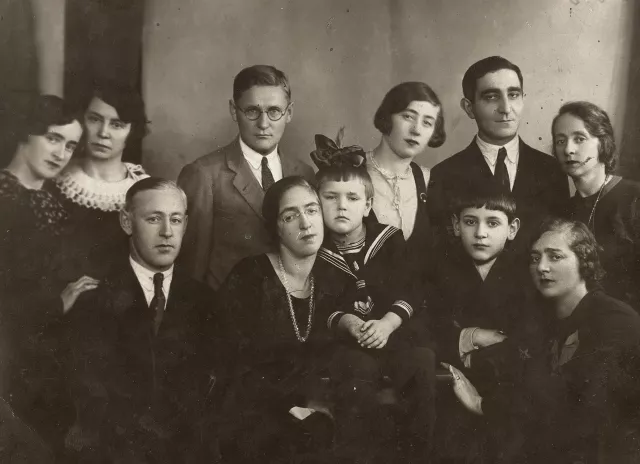This is the Goldberg family just before World War II.
It's the last picture of Yakov and my mother's sisters together. I am 5 years old here. Mother is sitting in the center with me by her side.
My father Boris Deribizov, the man wearing glasses, is behind my mother.
Her brother Yakov Goldberg is sitting to the left, and his first wife Anna, wearing a white collar, is standing behind him.
Mother's sister Shifra is on the left. The boy next to me is Liya's son Gdali Golumb. He died of starvation in the blockade of Leningrad.
His mother Liya is sitting on his right. Debora, my mother’s youngest sister, is standing first on the right, and to the left of her, Genrikh Yoffe and Rakhil, his wife and mother's sister.
My mother graduated from the Leningrad Training College for Grain Production in 1929 and once she went to the party of her fellow countrymen from Siberia and met papa there.
They married de facto in 1929. They didn't have a Jewish wedding ceremony. They just started to live together and kept their joint household from 1929 - that means they actually became husband and wife in 1929.
They didn't officially register their marriage until 1937, because back then single mothers were given cash benefits and as long as papa was ill they needed some extra income.
In 1939 they celebrated the 10th anniversary of their marriage and there were many guests invited. They were both atheists, and of course, this celebration was secular.
My father, Boris Deribizov, was born in 1900. He was Russian. He was from Warsaw [today Poland], but I always put down in all questionnaires that he was born in Ulan-Ude, for fear that personnel managers might think that he was born abroad, had I written 'Poland,' so I used to insert 'Ulan-Ude,' as mother had taught me.
But back then Poland was part of Russia. [Editor's note: Poland was partitioned between three powers in the 18th century and tsarist Russia got the largest part, which remained under Russian rule until 1920-21.]
I was born in Leningrad in 1930. We were living near the Griboyedova Canal then, at my mother's sisters' home. There was Liya with her son, Shifra, and mother brought her husband and me.
Grandma Sonya and Rakhil were still living in Nerchinsk at that time, and they had sent us the baggage, furniture and clothes to help their relatives, but all those things were already confiscated at the railway station.
Moreover, NKVD representatives had come to our apartment and wanted to seize our entire property from there, but father said that the belongings were his (and he's Russian), and only then did they leave us alone.
Papa worked very little, he was constantly sick, and mother worked and supported the entire family. Aunt Rakhil, when she came from Nerchinsk, looked after me.
Liya and Shifra also worked, Liya as a registrar, and Shifra as a book-keeper, both in one enterprise - Lenvodokanal project [Leningrad Project Institute of Water Supplies].
We lived on the embankment of the Griboyedova Canal, in the vicinity of the Nikolskaya Orthodox Church and the synagogue. Being but small kids we used to run into both. I remember once in the synagogue an employee of the community asked me: 'And what is a Russian girl doing here?'
I didn't understand what he meant. I had two white braids, but I never thought they were not allowed in a synagogue. I had a few friends among my classmates. Whether they were Jewish or not, I don't know. I was not interested in such questions then, at the age of ten.













